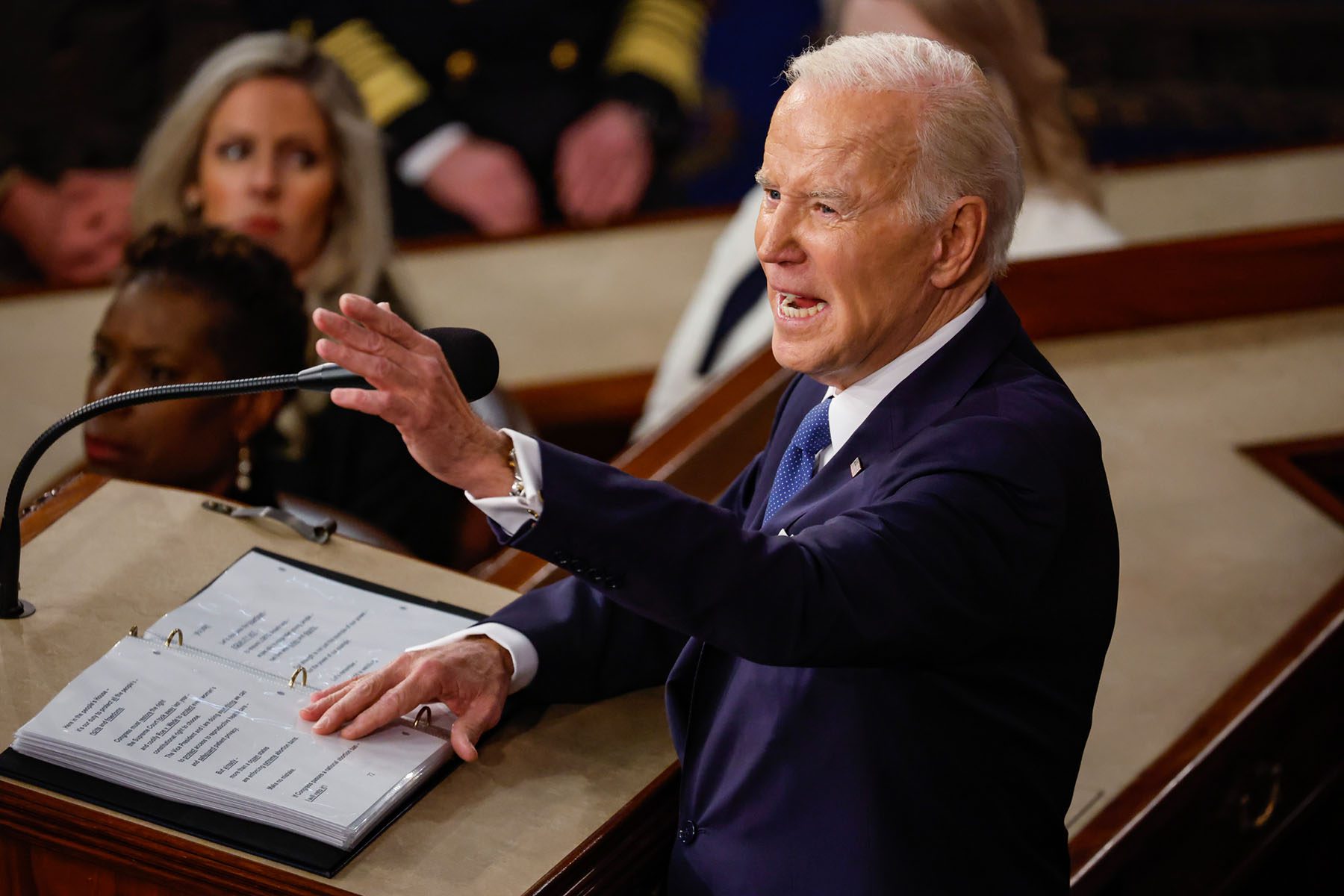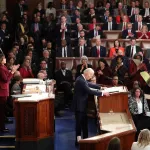Your trusted source for contextualizing the news. Sign up for our daily newsletter.
During his State of the Union address Tuesday evening, President Joe Biden devoted more words to abortion and fewer to LGBTQ+ rights in 2023 than in previous years, spending 72 and 35 words, respectively, on the topics out of a nearly 7,300-word speech.
Biden called on Congress to restore “every woman’s constitutional right to choose” by codifying Roe v. Wade and protect LGBTQ+ Americans by passing the Equality Act. In 2022’s State of the Union, he used 37 words when addressing abortion access and spent 58 words talking about LGBTQ+ Americans. In his 2021 address to Congress, Biden did not mention abortion and spent 40 words talking about LGBTQ+ Americans. Counts for 2022 and 2023 are based on his remarks as prepared for delivery.
“The vice president and I are doing everything we can to protect access to reproductive health care and safeguard patient privacy,” Biden said during the speech. “But already, more than a dozen states are enforcing extreme abortion bans. Make no mistake: If Congress passes a national ban, I will veto it.”
The president’s State of the Union address, mandated by the Constitution, is given annually before Congress and is meant to review the year’s accomplishments and outline future policy goals. (In a president’s first year, they usually give an address to a joint session of Congress, but it’s not technically a State of the Union address.) Countless voices and political players from the executive office and Congress influence its contents.
Lori Cox Han, professor and chair of American presidential studies at Chapman University, said the topics and issues that the president ultimately chooses to talk about signal what and who is important. A lot of “important constituent work” happens during these 60- to 80-minute events.
“Presidents try to speak to the entire American population, but they also know that they have certain groups within their coalition that they need to recognize,” said Han, who has written several books on presidential communication and the American presidency. “And what the White House hopes to do every year is to place these items on the public agenda in a way that will help them the next time voters go to the polls.”
Han said women and LGBTQ+ people are important to Biden and to the Democratic Party because they helped put him in the White House and could play a big role in keeping him there.
Still, issues that disproportionately impact women and LGBTQ+ people often get a fleeting mention in Biden’s speeches. His speeches have ranged from nearly 6,500 words in 2021 to over 8,000 words in 2022. The majority of Biden’s speech Tuesday covered the state of the economy and infrastructure. Last year he devoted a significant amount of time to the Russian invasion of Ukraine.
-
More from The 19th
- Biden keeps LGBTQ+ remarks brief in State of the Union as queer Americans face hostile legislation
- Biden calls out abortion by name and skewers ‘extreme’ bans in State of the Union address
- ‘They need to see’: RowVaughn Wells on what it means to attend Biden’s State of the Union address
The 19th reviewed prepared remarks for Biden’s 2023 and 2022 State of the Union speeches, as well as his 2021 congressional address, highlighting sections in which the president spoke explicitly about abortion, LGBTQ+ rights and other issues that we cover. We also noted any time he discussed other typically gendered topics, like child care or working mothers, for a wider view of how he spoke to and about marginalized communities. We then counted the words spoken about each topic and compared them year-over-year.
Abortion
Abortion is an uncommon topic in State of the Union addresses, and most presidents who mention abortion do so to condemn it. President Ronald Reagan was the first to explicitly address abortion, making an impassioned plea to “find positive solutions to the tragedy of abortion” in 1984 during a reelection campaign. President Barack Obama became the first president to express support for abortion, doing so in his penultimate address in 2015; Biden became the second last year.
Biden explicitly called out attacks against Roe v. Wade in 2022, after not mentioning the subject at all in 2021. He said access to health care must be protected, including the “right to choose,” and called for advancements in maternal health as well.
This year, Biden used the word “abortion” twice, once in reference to more than a dozen states’ bans and again while threatening to veto a national abortion ban if Congress were to pass that measure.
This is Biden’s first State of the Union address since the Supreme Court overturned Roe v. Wade in June, leaving the legality of abortion up to the states. The administration made several moves to protect abortion access, but millions of Americans now live in states where it is not readily available.
LGBTQ+ issues
This year marked the third time Biden asked Congress to pass the Equality Act, a landmark bill that would bar discrimination on the basis of sexual orientation and gender identity. He is the second president after Obama to specifically include transgender Americans in the annual speeches.
He left out the personal address to transgender Americans he made in the previous two years — “I will always have your back as your president” — and earlier in the speech, listed the Respect For Marriage Act in a line-up of bipartisan legislation he signed into law.
Biden’s mention of the Equality Act this year comes as a wave of anti-trans bills were prefiled ahead of 2023 state legislative sessions. Most states moving to pass these laws are focused on banning gender-affirming care for trans youth, while others have expanded these proposed bans to adults. Last year, more than 20 states had also introduced “Don’t Say Gay” laws, which restrict public school teachers from discussing LGBTQ+ history or people in school curriculums. Biden did not specifically address any of these statewide laws.
Other key topics
In his addresses, Biden has taken on other issues that disproportionately impact women and LGBTQ+ people. He has consistently talked about the need for more affordable child care, the restoration of the expanded child tax credit, and the importance of better accommodations for family caregivers looking after seniors and people with disabilities.
“Let’s also make sure working parents can afford to raise a family with sick days, paid family and medical leave, and affordable child care that will enable millions more people to go to work,” Biden said Tuesday.
Biden also dedicated a couple hundred words to education, calling for universal pre-K, higher salaries for public school teachers and two free years of community college.
Compared with previous years, Biden spent less time this year addressing women’s rights — briefly celebrating the Violence Against Women Act, which he had called on Congress to reauthorize in 2021 and 2022.
Hearkening back to the Capitol riot more than two years ago on January 6, Biden also spoke to the need to “protect the right to vote” and “honor the results of our elections.” He condemned political violence, drawing a line between the rhetoric used during the insurrection and the attack on Paul Pelosi, who was in the crowd as one of the first lady’s guests. The assailant was looking for Nancy Pelosi, demonstrating the violent misogyny women in power often face.
Many of the anecdotes interspersed in his addresses involving everyday people are about women, such as the story of a nurse administering COVID-19 vaccines in 2021. Last year, he told the story of speaking with a mother whose child and husband both have Type 1 diabetes as a way to illustrate the impact of pharmaceutical mark-ups.
This year, the president called out several women guests, including RowVaughn Wells, the mother of Tyre Nichols, and Saria Gwin-Maye, an ironworker he referenced in his discussion of infrastructure funding.





